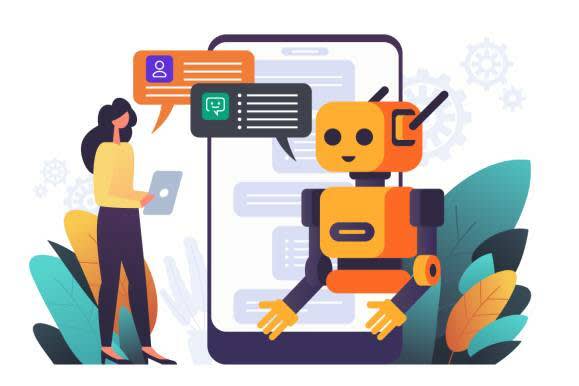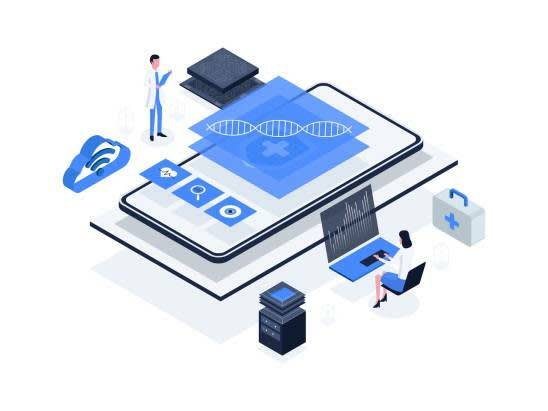Apply AI in Decision-Making
Learning Objectives
After completing this unit, you’ll be able to:
- Identify AI use cases and describe how AI helps businesses across industries make strategic decisions.
- Explain how government agencies can use AI for decision-making.
- Describe how AI is improving healthcare.
- Explain the ethical considerations for using AI in different scenarios.
From business and healthcare to government and public policy, AI is transforming decision-making processes, optimizing business operations, and enhancing healthcare and public governance. In this unit, you explore AI's pivotal role in decision-making across various sectors.
AI in Business Decision-Making
Integrating AI into Business Strategy and Decision-Making
Businesses have entered an era where data-driven decision-making is predominant. And AI is at the heart of this transformation. Using AI, organizations can extract valuable insights from data, streamline operations, and drive growth. In this section, let’s explore how businesses are integrating AI into their decision-making processes.
AI scours through vast amounts of information to help businesses make informed choices. Companies big and small have embraced AI to augment their decision-making capabilities. For example, the world’s largest ecommerce platforms use AI algorithms to predict what products customers are likely to buy.
By analyzing past purchase patterns and browsing history, AI assists in optimizing inventory management and enhancing customer satisfaction. This results in a seamless shopping experience for customers while maximizing the ecommerce company’s efficiency.
Another excellent example is AI-driven chatbots and virtual assistants. Companies can utilize these AI tools to provide instant customer support. When you chat with a customer service representative online and receive quick, helpful responses, you’re likely interacting with an AI chatbot. These chatbots are trained to handle routine inquiries, resolve issues, and improve the overall customer experience by reducing response times.
Have you used an AI co-pilot? These are artificial intelligence systems that assist or collaborate with a human user in various tasks or activities. AI co-pilots enhance productivity, provide guidance, and improve decision-making across a range of domains. Developers are rapidly adopting AI co-pilots to help with writing and fixing code.

Another area where AI shines is personalized marketing. For example, streaming services harness AI algorithms to recommend content tailored to individual preferences. When you see recommended movies or TV shows that match your taste, it’s the result of AI analyzing your viewing history and suggesting content you’re likely to enjoy. This not only keeps you engaged but also increases your loyalty to the platform.
Business Process Optimization with AI
AI is also a process optimizer. It helps businesses streamline their operations, enhance efficiency, and reduce costs. For example, retailers use AI to predict customer demand. By analyzing vast amounts of data, including historical sales, seasonal trends, and even weather forecasts, retailers using AI can optimize their inventory to ensure that the right products are in stock at the right time, minimizing waste and preventing stockouts.
Imagine you're shopping for groceries at your local supermarket. You may not notice it, but AI is working behind the scenes to ensure that products are available, prices are competitive, and the store layout is optimized for your convenience. The result? A smoother and more pleasant shopping experience for you, and greater operational efficiency and profitability for the store.
AI has become an indispensable tool in business decision-making, offering valuable insights, enhancing customer experiences, and driving operational efficiency. It empowers organizations to adapt to ever-evolving market dynamics, make data-informed choices, and remain competitive in a fast-paced world. Using AI in a targeted way, businesses can navigate complexity, uncover opportunities, and chart a path toward sustained success.
AI in Healthcare Decision-Making
In the realm of healthcare, the integration of artificial intelligence has brought about a transformative shift in how medical professionals make critical decisions. AI applications have emerged as invaluable tools for improving diagnostic accuracy, treatment planning, and patient care.

The Impact of AI on Healthcare Decision-Making
AI is like a brilliant assistant for healthcare professionals. It can process vast amounts of patient data, analyze it for patterns and abnormalities, and offer valuable insights that assist doctors, nurses, and medical practitioners in making well-informed decisions. The use of AI in healthcare spans various domains, including medical imaging, patient data analysis, and drug discovery.
For example, when a patient visits a hospital with symptoms of a disease, AI can rapidly analyze the patient's medical history, laboratory results, and medical images, such as X-rays or CT scans. By comparing this data with a vast repository of medical knowledge, AI can help clinicians make more accurate diagnoses. This can lead to earlier interventions, timely treatment, and improved patient outcomes.
AI in Medical Diagnosis and Treatment Planning
Imagine AI as a medical detective with an incredible memory. It can study thousands of medical cases and detect patterns that may not be immediately apparent to human observers. In the field of medical imaging, AI algorithms are employed to detect anomalies and support radiologists in interpreting complex scans.
For example, the Google DeepMind research team has developed AI algorithms capable of detecting diabetic retinopathy from retinal images. Diabetic retinopathy is a condition that can lead to blindness if not detected and treated in its early stages. By analyzing retinal images, AI can identify signs of the condition, allowing for early intervention and better patient outcomes.
Furthermore, AI’s capabilities extend to treatment planning. In oncology, AI-powered systems like IBM Watson for Oncology analyze vast amounts of medical data and research to provide oncologists with treatment recommendations. These recommendations are based on the latest medical literature, patient-specific information, and clinical guidelines. By leveraging AI, healthcare professionals can access cutting-edge information and make more personalized treatment decisions.
Ethical Considerations in AI-Powered Healthcare Decisions
While the integration of AI in healthcare holds great promise, it also raises ethical considerations. You’ve learned that AI-driven decisions can have significant consequences. This is especially true in a field as critical as healthcare. AI-driven recommendations and decisions must align with a patient’s best interests.
Additionally, AI systems must respect patient privacy and obtain informed consent for interventions. For example, the use of AI in telemedicine and remote patient monitoring can raise concerns about data security and patient privacy. Healthcare organizations and AI developers must implement stringent security measures to protect patient data and ensure compliance with relevant regulations like the Health Insurance Portability and Accountability Act (HIPAA).
Ethical AI in healthcare extends to issues of fairness and bias. AI algorithms must be carefully designed to avoid discriminatory practices and ensure that recommendations are based solely on clinical evidence. Ongoing research and development in ethical AI aim to create safeguards against bias and to promote fairness and transparency in healthcare decision-making.
The integration of AI in healthcare decision-making represents a significant step toward more accurate diagnoses, improved treatment plans, and enhanced patient care. By working in tandem with healthcare professionals, AI ensures that decisions are data-driven, timely, and aligned with the best interests of patients. As AI continues to evolve, it will play an increasingly vital role in revolutionizing healthcare decision-making and improving patient outcomes.
AI in Policy and Government Decision-Making
The adoption of AI in the public sector is revolutionizing policy and government decision-making. AI has the potential to enhance the quality, efficiency, and fairness of government policies. Let’s see how it’s already informing government policies and decisions today.
AI Application |
Key Benefits |
|---|---|
Data analysis for policy insights |
Data-driven policy development and improved outcomes |
Predictive analytics for decision-making |
Enhanced decision-making through trend forecasting |
Automation in public services |
Streamlined services and cost reduction |
Public opinion analysis |
Real-time public sentiment analysis for policy adjustment |
AI's Role in Informing Government Policies and Decisions
AI is an invaluable resource for government bodies seeking to enhance their decision-making processes. By analyzing vast datasets, AI can identify trends, assess public sentiment, and predict future outcomes. This data-driven approach ensures that government policies are evidence-based and responsive to emerging challenges.
For instance, some large cities are using AI in their traffic management systems. These systems analyze real-time traffic data and adjust traffic signals accordingly, reducing congestion, improving urban mobility, and enhancing the daily lives of citizens.
Challenges and Considerations in AI Adoption in the Public Sector
The adoption of AI in government decision-making is not without its challenges. Ethical considerations, data privacy, transparency, and regulatory compliance are essential areas of focus when integrating AI into public policies.
AI used in government must adhere to ethical standards, ensuring that AI-driven decisions are made in the best interest of citizens. Transparency and accountability are critical, as the public should have visibility into how AI is used in government policies and decisions. The integration of AI in policy and government decision-making represents a significant advancement in making governance more efficient, data-driven, and responsive to citizens’ needs.
Review Real-World Examples
As you can see, AI has rapidly transformed the way we make decisions across many industries and domains. Click the tabs to review eight compelling examples.
Wrap It Up
AI is enhancing decision-making, improving efficiency, and providing personalized experiences. By using critical thinking, data, and artificial intelligence together, organizations have incredible potential to make ethical, well-informed decisions that foster success and innovation.
Resources